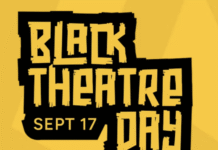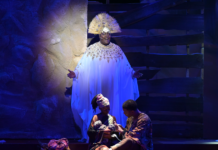This article is the first in a series of three articles about the cultural phenomenon, “Black Nativity: A Gospel Christmas Experience,” staged each year in Atlanta, GA by Robert John Connor, award-winning producer/director and CEO of Dominion Entertainment.
“Black Nativity” is a musical drama that reimagines the traditional Christmas story through the lens of African American culture and artistry. Originally a stage play written by Langston Hughes (1961), the story is a celebration of faith, family, and the spirit of Christmas, highlighting themes of hope, love, and redemption. By placing Black characters in a traditional narrative, it challenges dominant cultural narratives that often exclude or marginalize Black voices.
Emerging during the Civil Rights Movement, “Black Nativity” reflected the social and political climate of its time and resonates in the current cultural and political climate.
The impact of “Black Nativity” extends beyond its initial performances, having been adapted into a movie in 2013 and reimagined on stages across the globe, including Atlanta with award-winning director Robert John Connor, who has been producing the play for Atlanta audiences for decades through his company Dominion Entertainment.
Highlighting the enduring themes of love, faith, and community in the face of adversity, “Black Nativity” continues to uplift and appreciate black culture, spirituality and community.
In keeping with the creativity baked into this production, The Burton Wire is trying something a little different by creating a series of articles that tap directly into the voices of the creatives behind “Black Nativity: A Gospel Christmas Experience” at the Ferst Center for the Arts, Dec. 12-22. Instead of TBW asking the questions, the creatives are asking the questions they want to know of each other. With the help of Lisa Gee of ConnectingYOUto Public Relations, Corp., instead of TBW conducting the interviews, Lisa and I (Nsenga) thought it would be cool to have some of the many outstanding creatives involved in the production interview each other.
In a soulful remix of whose on first, we will hear directly from “Black Nativity” creatives:
Latrice Pace, cast member; Pace is a two-time Stellar award nominee, Billboard charting member of the Grammy-nominated gospel group, The Anointed Pace Sisters and Suzi Bass Award winner for What’s Done in the Dark, Scissors and I Know I’ve Been Changed.
Maurice Griffin, cast member; Griffin made his musical theater debut in Peter Pan at the age of five. The multi-hyphenate has gone on to achieve success as a TV, Film, Stage & Commercial actor. Maurice’s extraordinary vocal ability enabled him to be a finalist on BET’s Sunday Best, as well as sing for diverse audiences across the globe.
Robert John Connor, Executive Producer and Director. A Morehouse man, Connor is a multi-talented director/producer/actor/singer/writer. He is the Chief Executive Officer/Artistic Director of Dominion Entertainment Group and founder of Dominion Arts Foundation, Inc. a non-profit organization whose mission is to facilitate cultural enrichment opportunities, employment, training and internships through programming and partnerships with arts and entertainment organizations for underserved community members.
In the first article of the series, Latrice Pace chats with Robert John O’Connor about the motivation behind producing “Black Nativity: A Gospel Christmas Experience” and using his platform for spiritual and cultural expression. Check it out:
LP: What inspired you to bring Black Nativity to Atlanta and how has your creative vision for this evolved over the years?
RJO: I guess I’m foolish enough to try. That’s the overarching answer. Ever since I had done Black Nativity back in the early ‘90s, I was never able to shake the experience and how valuable the show was for me as an artist and as a person of God and a person of faith. I was living in Las Vegas at the time and decided to try to produce this and made an effort to do so. I did not quite find the market for it, but I started thinking of ways to refashion this particular piece. Then one day, I got up and told my wife, “I got it!” I told her that I wanted to adapt it and turn it into a one-act play. That was right around the time when I returned to Atlanta. True Colors Theatre Company was producing the play, and I saw Mother Benning also known as Mabel Benning, an icon in black Atlanta and theatre at a show, and she said “Robert, True Colors is not going to do Black Nativity this year. You should do it!” So, I took a stab at it with no money and the gift of time and talent that friends gave. And, over the years it has really evolved into what I feel God placed on me. It was a struggle for sure, but it’s absolutely been a worthwhile journey.
LR: How do you balance the powerful things of faith and culture in Black Nativity while also making it resonate with modern audiences?
RJO: I fuse in a little bit for everybody. I’ve used modern songs, modern dance and spirituals. And there’s a little bit of music and dance for every person to appreciate. And with the caliber of talent that we have and the artistry that happens on stage, it is something that draws audiences in very quickly and makes them walk out feeling very revived and hopeful and inspired.
LR: Through Dominion Arts Foundation, you’ve impacted over 21,000 youth and as a creative powerhouse, you have helped mold the careers of stars like Joaquina Kalukango, Tony Hightower, Maurice Griffin, and me. When you look back after your last production, what one word would you like to be able to say and why that word?
RJO: Thank you. “Thank you” are the biggest words I have. It really takes a whole lot of generosity for people when you’re trying to grow and develop your vision that people believe in enough to stay and to stand by me and to contribute in ways sometimes that I didn’t expect. Thank you for trusting me to know that I am an honorable person, a person of ethics and character, and really trying to do this thing. Latrice, you and I often talk about how this is sometimes a thankless journey. We, as artists, know that sometimes our riches lie in our gifts as they don’t always turn up in monetary ways. Back then, people gave up their time and talent for free because they believed in something that I believed in. And so, I am just full of gratitude for that over these many years.
LR: What has been your proudest achievement across your decades long career in the arts?
RJO: My proudest achievement has nothing to do with the arts. My proudest achievement is that I was able to, with the help of my glorious wife, Andrea, create a very well-rounded and kind and creative human being who can take our legacy somewhere. We did not push her. We did not influence her. She found her own way, kept it a secret, and then all of a sudden, we just saw her out there doing things. So yeah, that’s my proudest accomplishment — being able to pour into our child who makes us proud every day.
Black Nativity: A Gospel Christmas Experience is playing at the Ferst Theater, on the campus of Georgia Tech University, December 12-22, 2024.
This post was curated by Nsenga K. Burton, founder & editor-in-chief of The Burton Wire. It is the first in a series of three articles about Black Nativity: A Gospel Christmas Experience. The next article in the series will feature Black Nativity performer Latrice Pace asking Maurice Griffin questions about his professional journey. Read the second article in the series here.
Follow The Burton Wire on Instagram or Facebook. Follow Nsenga on Instagram @Ntellectual.








